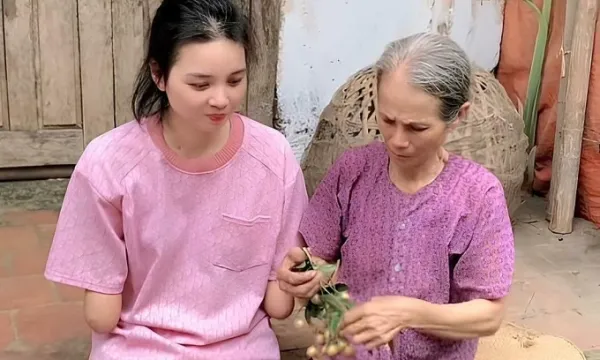
The tragic event happened in late 2024 after an otherwise healthy Nga suddenly developed a high fever and fell into a coma for seven days.
She was transferred to Bach Mai Hospital in Hanoi where she was put on an ECMO machine and underwent continuous hemofiltration.
Doctors concluded she had viral myocarditis, cardiogenic shock and multiple organ failure, causing poor blood circulation.
|
Tran Thi Nga during a 2023 trip, back when she was still in good health. Photo courtesy Nga |
When she woke up from the coma, her arms and legs had turned black. due to necrosis. To save her life, the doctors had to amputate all four limbs.
Fearing the financial burden of continued hospital treatment, Nga pleaded with her mother, Dong Thi Thuy: “Mom, please let me go home to Phu Tho. I’ll make the most of whatever time I have left. I don’t want to be a burden on my husband, children or family.”
Unable to convince her to stay in the hospital, her family brought her two children to Hanoi to encourage her to continue treatment.
Her 10-year-old daughter hugged her, wiped her tears, and spoke encouragingly, but her seven-year-old son, seeing his mother covered in tubes and her limbs blackened, was frightened and ran outside.
She says: “At that moment I realized my son was too young to lose his mother. I had to live for him.”
On Jan 20, 2025, after a five-hour surgery, Nga woke up, her body wrapped in white bandages. The physical pain mingled with despair. “But looking at my mother’s dark circles and thin face, I thought I had to get better quickly so she could go home soon,” she says.
She forced herself to swallow every spoon of milk and gruel. Thuy often played for her videos of disabled people rebuilding their lives. Three months later Nga was discharged.
With her husband working far away and her in-laws being old, she moved to her maternal home for easier care. On her first day home she turned her face to the wall, tears streaming down, unable to wipe them away herself.
|
Tran Thi Nga and her grandmother seated on the porch in June 2025. Screenshot from video |
For all her daily activities she had to rely on her parents and children. Her daughter would run over to rub her when a mosquito bit. But sometimes the children would forget what happened to her. One morning her son said: “Mom, I want mixed noodles, please make some.”
Nga replied, as if reassuring herself: “Mom is still in pain. With my hands and feet like this, I can’t cook yet, but I will be able to, gradually.”
After that incident she asked her mother to help her sit up more often so that she could exercise on the bed to strengthen her muscles.
When some philanthropists donated her prosthetic legs, she started to practice walking. But without hands to balance, she fell over many times, “collapsing like a banana tree” and even passing out. A few minutes later she would wake up and ask her family to help her practice again.
Her father built a set of parallel bars, allowing her to lean against them and practice standing. Now, after several months, Nga can walk a few rounds around the yard with her prosthetic legs and feed herself using a support machine. She has gradually opened up to visiting neighbors and friends.
People encourage her to livestream on social media to chat. After a few practice sessions, she started affiliate marketing (introducing others’ products for sale online).
On the first day she earned VND4,000 (US$0.15). The next day it was VND14,000, then VND37,000. “It felt like receiving a million-dong salary again,” she says.
Many people who knew Nga’s situation advised her to try selling goods online. She began to post local products like peanuts and vermicelli, and, to her surprise, got lots of support. Thanks to this, she had money to buy medicines and go for monthly follow-up visits.
But suddenly, in late October, her videos started attracting accusation such as “This is AI,” “Scam,” and “Faking disability to make money.”
During livestreams she began to be constantly challenged, forcing her to pause and clarify. Then, exhausted, she decided to stop.
After a few days she returned to social media but was no longer selling; she only talked about her life. She wants to be a source of motivation.
“If someone who lost all their limbs like me still wants to live, then the minor difficulties out there are not impossible to face,” she says.
She remains determined to achieve her goal of soon being able to cook her two children’s favorite mixed noodles. “If I can still love, if I can still live for others, then I haven’t lost anything at all.”
Tran Thi Nga shares an afternoon sticky rice meal with her two children, July 2025.